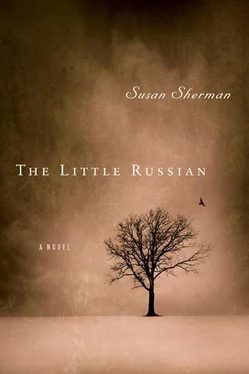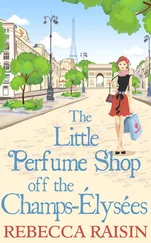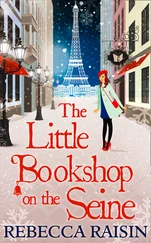Susan Sherman
THE LITTLE RUSSIAN
With thanks to my remarkable editor and valued friend, Dan Smetanka
Blessed art Thou, Lord our God, King of the universe, Who did not make me a slave.
THE BIRCHOT HASHACHAR
May 1897
THE GIRLSTOOD on the platform and stared at the wire that stretched out before her. She was young, not much over fourteen, but the body of a woman strained against her ballet costume. She wore dirty pink tights that bulged at the knee and a cardboard tiara that sparkled in the sun. The tulle skirt was torn in several places, dropping sequins on her tights and slippers. Her mother stood directly below her, cranking a barrel organ that alternated between two popular songs.
“It is time to begin, maideleh ,” she called up. “They’re waiting.”
It was market day and the air smelled of rotting fruit, manure, and sweating horses. Jewish housewives, still clutching their checkered winter shawls, strolled up and down the aisles of stalls. Over by the rag dealer, women pulled on worn dresses over their clothes. If they liked their reflection in the little mirror hanging on the stall, they kept it to themselves. Better to bargain the price down.
The girl looked out on the crowd that had stopped to watch her. She took a breath and with arms outstretched stepped onto the wire. She paused and waited for the wire to stop bouncing and then took another cautious step. One boy in the back was not fooled by her trepidation. He knew it was all part of the act. He had seen her performance earlier on his way to school and knew she only appeared frightened to win the sympathy of the audience. Soon her confidence would appear to grow as her tricks became increasingly more difficult. In the finale, she would execute a perfect handstand and finish with the splits, her legs delicately balanced on the wire, her arms held high in triumph.
The boy knew he needed to get going. School had let out nearly an hour ago and he was expected at the Chernyi Griaz, a billiards club on the edge of the shtetl that filled with officers from the Zhitomir regiment during the summer months. He went there to play chess and satisfy the bets of those who chose to put their money on him. They called him the wonder boy.
Nobody knew how good he really was. He was always throwing games to keep the odds interesting and the opponents coming. In truth, there was only one man in town who could legitimately beat him, and that was his father. The rest he simply managed, but always in a believable way. It was important to give the impression that he was fallible, a mere human being, although he didn’t believe it for a minute. At fourteen, he was anything but humble. Even so, he hid his pride well, knowing that it could get him into trouble. It was important to hide his light under a bushel, as his mother would say. This was an American saying that the boy’s older sister had written in a letter home. Υou don’t have to hide your light under a bushel in America , she wrote from Rice Lake, Wisconsin. Here you don’t have to be afraid to stand tall.
Stand tall was another American saying. But Rice Lake, Wisconsin, was a long way from Little Russia. “In the Pale, if you are a Jew, it doesn’t hurt to slump a little,” his mother would caution. A kluger gait tsu fus un a nar fort in a kareteh , she would say in plain Yiddish. A wise man walks on foot and a fool rides in a coach.
The girl took halting steps forward and backward, gradually becoming more graceful, more self-assured, extending a leg out behind her, holding the difficult pose with nothing but air beneath her. The crowd clapped and several peasant boys hooted and whistled. When she appeared to lose her balance, they gasped and froze in disbelief. In the next instant, she steadied herself and there was a great sigh of relief. The boy knew this too was part of the act.
During the finale, the girl executed a perfect handstand, her legs extending straight and stiff over her shoulders, her hands firmly grasping the wire. When the crowd pressed forward to get a better view, someone pushed the rope spinner, who stumbled against the shoe peddler, who tripped and fell against a peasant eating a meat pie. The young man had come to town to buy a scythe handle. He pitched forward and spilled the pie all over the blouse that his mother had embroidered for his name day. When he saw what had happened, he turned on the shoe peddler, shouting and cursing at him. The poor man was so frightened he didn’t know what to do. He stood there paralyzed, which infuriated the muzhik all the more. Soon the young man was beating the Jew with his brand new scythe handle, unmindful of the blood that mixed with the gravy on his shirt.
There were those who tried to help the shoe peddler, but they were beaten back by the other muzhiki. There were shouts and screams all around. The boy couldn’t see what was happening and tried to push his way through, but the throng was too thick. When it thinned, he found the shoe peddler, his shoes still hanging around his neck, lying dead in a pool of blood. The peddler’s children were standing nearby, dry-eyed, watching their mother sob over the body of their father. Women from the town had gathered around her, trying to coax her away, but the widow preferred to sit in the road, rocking back and forth.
THAT AFTERNOON the muzhiki sent a delegation to deliver an ultimatum: five thousand rubles by morning or suffer a pogrom. Women panicked when they heard the news, grabbed their children, and ran home. Shopkeepers shuttered their windows and bolted their doors. The men gathered at the volunteer fire station to deliberate. It was a large loft over the butcher shop, with a makeshift stage at one end and a stack of wooden folding chairs at the other. Under the exposed trestles, men rubbed their beards and paced up and down, while they searched in vain for a way to save their town.
The boy sat at the back and watched his father, the starusta , the head of the town, conduct the meeting with his usual composure, giving the floor first to the butcher, then to the water carrier, letting everyone have their say without comment.
“I say we fight,” said Yankel Schneider, the blacksmith and a well-known hothead. “We have the numbers and we’re strong. We could give them at least as good as we get.”
“But they have guns,” said Dr. Mikhaeli, the town doctor. “We don’t. And even if we did, we wouldn’t know how to use them.”
“What is there to know?” said Yankel, irritably. “Just point and shoot.”
The baker wanted to call in the army. But the water carrier laughed at him. Everybody knew the army wouldn’t lift a finger to help the Jews. The grain merchant offered a hundred rubles to stop the catastrophe. Others pledged five or ten depending on their circumstance.
As the afternoon faded into night and the kerosene lamps were lit, the boy grew impatient waiting for his father to unveil a plan. He knew his father would have one. He lived life in the same way he played chess, quietly, patiently, taking his time, following clearly laid-out paths to assured ends. The boy was confident that this crisis would be no exception.
But what the boy didn’t know was at that very moment the local muzhiki, at least twenty of them, had arrived in the town square with carts loaded with empty potato sacks, brought in anticipation of a rich bounty torn from the shops and homes of the Jews.
Читать дальше













